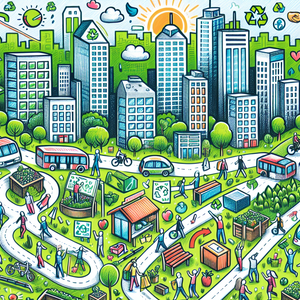The Unexpected Surge in Environmental Studies: A New Academic Trend

The most compelling factor contributing to the rise of environmental studies is the increasing awareness of climate change and its catastrophic effects. A 2021 report by the Intergovernmental Panel on Climate Change (IPCC) underscored that human activities are responsible for global warming, leading to extreme weather events, rising sea levels, and biodiversity loss. This alarming information has not gone unnoticed by younger generations, many of whom are deeply concerned about the planet's future. Students are no longer viewing environmental issues as distant threats; instead, they see them as immediate challenges that require innovative solutions. Activism movements, such as Fridays for Future, led by young climate activist Greta Thunberg, have galvanized student populations, motivating them to pursue academic paths that equip them with the knowledge and tools to address these pressing issues. This surge in activism has permeated educational institutions, resulting in a growing number of students choosing to specialize in environmental studies as a means of making a tangible impact.
Sustainability Initiatives in Education
In response to this growing demand, universities are expanding their environmental studies programs and integrating sustainability into various disciplines. Institutions are increasingly recognizing that education plays a crucial role in fostering a sustainable future. Many universities now offer interdisciplinary programs that combine environmental science, policy, and social justice, allowing students to approach environmental challenges from multiple perspectives. For instance, the University of California, Berkeley has launched initiatives that not only focus on environmental science but also incorporate elements of business, engineering, and public policy. This holistic approach helps prepare students to tackle complex environmental issues in real-world contexts. Additionally, programs often include hands-on learning experiences, such as internships with environmental organizations, fieldwork, and research projects, which enhance students' engagement and commitment to the field.
Supporting Example: Collaborative Programs
At institutions like Yale University, students can delve into the Yale School of the Environment (YSE), where they are trained not only in environmental science but also in practical approaches to sustainability. Students engage with local communities, working on projects that address real-world environmental issues, bridging the gap between theory and practice. This emphasis on experiential learning equips graduates with the skills necessary to influence policy and drive sustainable practices in various sectors.
Career Opportunities in a Growing Field
The surge in environmental studies is not merely an academic trend; it also reflects a significant shift in the job market. As governments and organizations prioritize sustainability, the demand for skilled professionals in environmental science, policy, and management is on the rise. According to the U.S. Bureau of Labor Statistics, employment in environmental science and protection-related fields is projected to grow by 8% from 2020 to 2030, much faster than the average for all occupations. Students pursuing degrees in environmental studies are finding diverse career opportunities, ranging from environmental consultants and sustainability coordinators to policy analysts and conservation scientists. These roles not only offer the chance to make a positive impact on the planet but also come with the potential for fulfilling and financially rewarding careers. A recent survey indicated that environmental studies is now the second most popular career path among university students, reflecting the growing recognition of the importance of sustainability in the job market.
A Shift in Cultural Values
The increasing interest in environmental studies also reflects a broader cultural shift towards valuing sustainability and social responsibility. Today's students are more conscious of their consumption habits and the ecological footprints they leave behind. They are seeking careers that align with their values and contribute to the greater good. This growing emphasis on ethical and sustainable practices has implications beyond individual career choices; it signals a collective movement towards a more sustainable and equitable society.
Supporting Evidence: Generational Mindset
A 2022 survey conducted by Deloitte revealed that 77% of millennials and Gen Z respondents consider sustainability when making purchasing decisions. This mindset is directly influencing their educational and career choices, leading them to pursue fields that prioritize environmental stewardship and social equity. The alignment of personal values with career aspirations is reshaping the landscape of higher education and the workforce.
The unexpected surge in environmental studies as an academic trend is a hopeful sign in the face of pressing global challenges. As students increasingly recognize the importance of sustainability and environmental stewardship, they are equipping themselves with the knowledge and skills necessary to drive change. This growing interest not only shapes individual career paths but also has the potential to create a more sustainable future for our planet. By investing in education and fostering a culture of sustainability, we can empower the next generation to tackle the environmental issues that define our time. The rise of environmental studies is not just a passing trend; it represents a critical shift in how society views and addresses the complexities of climate change and sustainability. As this movement continues to gain momentum, we can look forward to a future where environmental concerns are at the forefront of academic inquiry and professional practice, ultimately leading to a healthier, more sustainable planet for generations to come.
Environmental Policy Analyst
Government agencies (e.g., EPA), NGOs (e.g., World Wildlife Fund), think tanks
Core Responsibilities
Research and analyze environmental policies and regulations to assess their effectiveness.
Prepare reports and recommendations for government agencies or NGOs to influence policy decisions.
Collaborate with stakeholders, including government officials, businesses, and community organizations.
Required Skills
Strong analytical and critical thinking abilities.
Excellent written and verbal communication skills for report writing and presentations.
Familiarity with environmental laws and regulations.
Sustainability Consultant
Consulting firms (e.g., McKinsey & Company), corporations with sustainability departments, non-profits
Core Responsibilities
Assess corporate sustainability practices and provide strategic recommendations for improvement.
Conduct sustainability audits to identify areas for energy efficiency and waste reduction.
Develop and implement sustainability initiatives and programs that align with client goals.
Required Skills
Knowledge of sustainability frameworks (e.g., ISO 14001) and reporting standards (e.g., GRI).
Strong project management skills and the ability to work with cross-functional teams.
Proficiency in data analysis and reporting tools.
Conservation Scientist
Government agencies (e.g., U.S. Forest Service), environmental NGOs, research institutions
Core Responsibilities
Manage and protect natural resources by developing conservation plans and conducting research.
Monitor ecosystems and wildlife populations to assess the health of the environment.
Collaborate with government agencies, community groups, and stakeholders to promote conservation initiatives.
Required Skills
Strong background in biology, ecology, or environmental science.
Ability to use GIS and other mapping tools for environmental assessment.
Excellent fieldwork skills and capacity for data collection and analysis.
Environmental Educator
Nature centers, schools, non-profit organizations focused on education
Core Responsibilities
Develop and deliver educational programs on environmental conservation and sustainability for schools and communities.
Engage with the public through workshops, presentations, and hands-on activities.
Collaborate with educational institutions to integrate environmental curricula.
Required Skills
Strong communication and teaching skills, with experience in public speaking.
Passion for environmental issues and the ability to inspire others.
Knowledge of educational pedagogy and curriculum development.
Renewable Energy Project Manager
Renewable energy companies (e.g., NextEra Energy), engineering firms, government agencies promoting clean energy initiatives
Core Responsibilities
Oversee the planning, execution, and completion of renewable energy projects, such as solar or wind farms.
Coordinate with engineers, contractors, and regulatory bodies to ensure project compliance and success.
Manage project budgets, timelines, and stakeholder communications.
Required Skills
Strong knowledge of renewable energy technologies and project management methodologies.
Experience in financial analysis and risk management.
Excellent organizational and leadership abilities.


